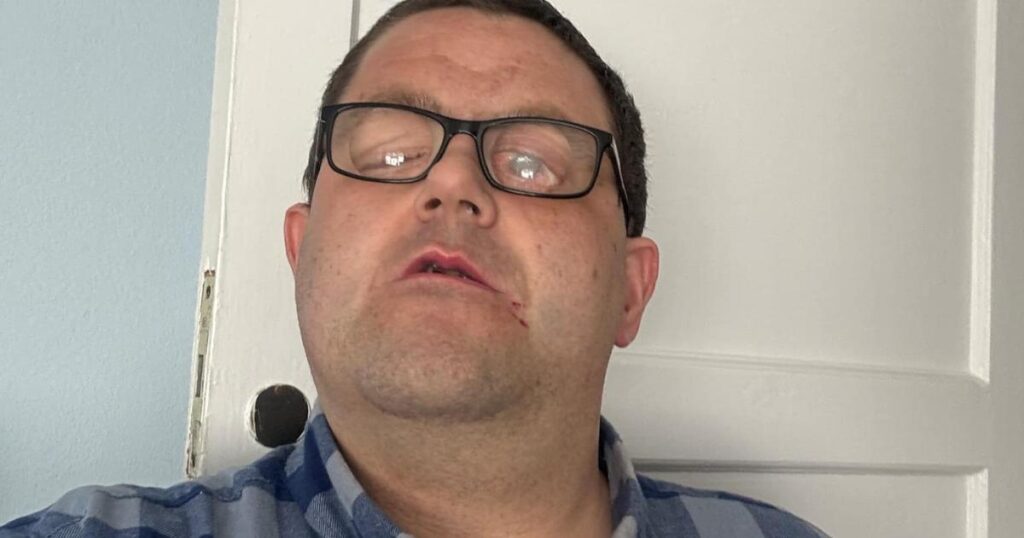Stuart Guy, who was born with cataracts and has lived with severe sight loss for most of his life due to glaucoma, could be one of the many disabled people in the UK impacted by proposed cuts to welfare spending.
The 37-year-old has significant sight loss and is registered as Severely Sight Impaired, with a visual acuity level of 1/60, and also lives with severe anxiety.
Stuart is currently in receipt of PIP, receiving the enhanced rate for mobility and care, as well as Employment and Support Allowance (ESA), although the government has announced plans to move ESA claimants to Universal Credit.
Stuart told the News Shopper: “PIP is there to help you with the day-to-day tasks, like in my case I can’t see to read the packets of things or to know if the floor is hoovered properly.
“But it’s also like things such as a cab to take me to the doctors or to the shops, thing I might otherwise find a challenge.”
Under new Government plans proposed by Chancellor Rachel Reeves, welfare spending could be cut by £5 billion, alongside several major reforms to the Personal Independence Payment (PIP).
Applicants claiming PIP from November 2026 must score a minimum of four points in at least one activity category to qualify for the daily living component of PIP, along with plans to merge the health component of Universal Credit with PIP.
However, many disabled people have called out the government on these plans, with a series of protests led by disability activists taking place outside Parliament last week.
Stuart explained: “PIP gives you that support and safety net in knowing that you would be able to undertake a journey, like to visit family, or would be able to have some help in for daily tasks.
“Essentially it’s there for daily tasks and things that some may take for granted who don’t live with a disability.”
PIP is a non-means tested benefit awarded to people living with mobility or care needs due to a disability, to assist them with the additional costs associated with their disability.
Stuart told News Shopper that his PIP is a “vital” source of funding for the daily needs associated with a disability, like taxi fares and subscriptions for assistive technology apps, as well as being able to fund assistance to help with daily tasks like checking food labels or cleaning.
According to Scope, disabled people are estimated to spend an additional £975 a month on additional costs associated with being disabled.
Stuart explained: “The ultimate thought is how can any of us survive, because of the detrimental effects this will have on myself and many others.
“How much worse can it get? Because within the next 12 to 18 months, significant changes will have a huge effect on us.
“And I reckon there’s going to be a lot more distress and mental health issues, it’s going to have a detrimental effect on anxiety and mental health.
“I would love to invite a journalist or MP to do role reversal for just for a week or two, to try and live life like we have to.
“Now with the cost of living you’re making minor adjustments, but in terms of the future life will be unimaginable and I reckon there will be a lot more distress and mental health issues.”
Stuart added that he would “like to be in employment” but has experienced barriers due to both a “lack of awareness and accessibility.”
“These barriers are from start to finish,” Stuart said, “From lack of accessible transport to not being able to apply because the websites aren’t accessible.
“Even with things like the Access to Work scheme, I’ve had friends who have waited weeks and weeks to be awarded, and employers don’t want to wait that long, they want you to start from the get-go.”
Should these planned reforms go ahead, people like Stuart may no longer be eligible to receive things like a Freedom Pass or Blue Badge, for which some disabled people only qualify if they are in receipt of PIP.
Stuart explained: “I’m not against reform, but it’s the way they are doing it and how fast it’s being done.
“They are looking at a cost saving and seeing the easiest option, whereas they need to take in medical information being provided, rather than have it decided by someone who sits behind a desk.
“There’s a lot of stigma out there and it’s through a lack of knowledge.
“In order to solve a problem, you need to live the problem, you need to look at it from a first hand perspective of people who live it.”




